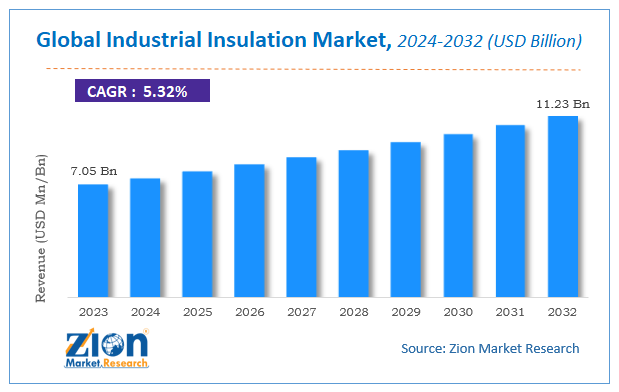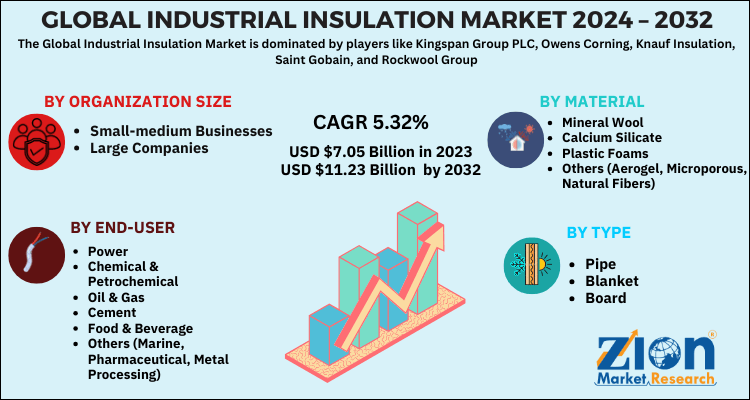Industrial Insulation Market Size, Share, Trends, Growth and Forecast 2032

Industrial Insulation Market: By Material (Mineral Wool, Plastic Foams, Calcium Silicate, Others), By Type (Pipe, Blanket, Board, Others), By End-Use Industry (Power, Cement, Oil & Gas, Chemical & Petrochemical, Food & Beverage, Others), And Geography: Global Industry Perspective, Comprehensive Analysis, and Forecast, 2024-2032
| Market Size in 2023 | Market Forecast in 2032 | CAGR (in %) | Base Year |
|---|---|---|---|
| USD 7.05 Billion | USD 11.23 Billion | 5.32% | 2023 |
Industrial Insulation Market Insights
According to a report from Zion Market Research, the global Industrial Insulation Market was valued at USD 7.05 Billion in 2023 and is projected to hit USD 11.23 Billion by 2032, with a compound annual growth rate (CAGR) of 5.32% during the forecast period 2024-2032.
This report explores market strengths, weakness, opportunities, and threats. It also provides valuable insights into the market's growth drivers, challenges, and the future prospects that may emerge in the Industrial Insulation industry over the next decade.
Global Industrial Insulation Market: An Overview
Industrial insulation is the process of protecting buildings from impact caused by regular or heavy-duty industrial applications. These can incur in the form of vibrations or disturbances in various forms. Generally, buildings require various protection measures to protect from fire, loud noise, among other factors. However, industrial insulation is a specialized process geared at isolating a wide range of impacts often caused by the specific industrial activity.
It's all about industrial thermal insulation. Thermal insulation prevents heat loss and absorption. It prevents industrial facilities like boiler room pipes and connections from wasting energy while working. Due to its insulating characteristics, cork can be used in many applications. Its long lifespan and heat resistance make it ideal for industrial use. Industrial insulation made of cork is fire-resistant and doesn't generate harmful byproducts. Insulation goods are used by builders, industrialists, transporters, and end users.
Market Dynamics
Global Industrial Insulation Market Drivers:
Rising Awareness Regarding Energy Conservation and Increasing Energy Costs
The industry receives immediate and long-term benefits from using insulation systems, some of which include protecting equipment, staff, systems, and budgets. Additionally, insulation is accountable for improving the performance of the system's machinery and processes, which reduces the expenses of production and energy consumption. In large-scale industries, acoustic insulation performance reduces high-frequency noises produced by machinery on the factory floor. The use of insulation helps to cut down on the capacity and size of new mechanical equipment that is required.
Additionally, it guards against the spread of fire to any industrial appliances, stops moisture from condensing on the apparatus, and shields the apparatus from damage at temperatures that are either extremely low or extremely high, hence reducing the likelihood of accidental harm.
Energy Costs and Sustainability
Insulation is one of the most reliable and inexpensive ways to conserve energy. Applying external insulation to industrial equipment, such as continuously operated brick wall furnaces, increases their heat storage capacity and modulates their average temperature. Other advantages of industrial insulation include frost protection for pipelines at low ambient temperatures, acoustic insulation in large factories to reduce high-frequency machine noises, and the prevention of mechanical damage to pipework and other components. Insulation can protect equipment and assist in achieving exceedingly high or low temperatures while reducing the risk of accidents. Moisture permeability is a crucial parameter in cryogenic engineering, as it can impair insulation's thermal conductivity.
The oil and gas industry and chemical manufacturers transport their products via vehicles or extensive, high-quality conduits. To preserve the original properties of flammable liquids and high-performance chemicals, perlite insulates the vessels and containers that transport them. Insulation and thermal mass provide industrial equipment and construction with an energy-efficient and cost-effective design, eliminating the need for a heating system and reducing operating expenses. Manufacturers are attempting to develop insulation materials that enhance a product's life cycle and, thus, its efficiency.
Global Industrial Insulation Market: Key Trends
The rising uncertainty due to climate change, and increase in need for protection for industrial establishments, and rising sophistication in manufacturing facilities will remain key drivers of growth during the forecast period. The growing sophistication in manufacturing faculties, and advent of automation will lead to new opportunities for innovative players in the global industrial insulation market. Robotic automation, and human-interaction is at its nascent stage. This has resulted in grave accidents in recent times, leading to severe damage, and subsequent liabilities. Moreover, the growing requirement for heating, and cooling facilities, cleanboard technology, and rising efficacy of mechanical protection promises major avenues for growth.
Industrial Insulation Market: Report Scope
| Report Attributes | Report Details |
|---|---|
| Report Name | Industrial Insulation Market |
| Market Size in 2023 | USD 7.05 Billion |
| Market Forecast in 2032 | USD 11.23 Billion |
| Growth Rate | CAGR of 5.32% |
| Number of Pages | 110 |
| Key Companies Covered | Kingspan Group PLC, Owens Corning, Knauf Insulation, Saint Gobain, and Rockwool Group |
| Segments Covered | By Material, By End-Use, By Type And By Region |
| Regions Covered | North America, Europe, Asia Pacific (APAC), Latin America, Middle East, and Africa (MEA) |
| Base Year | 2023 |
| Historical Year | 2018 to 2022 |
| Forecast Year | 2024 - 2032 |
| Customization Scope | Avail customized purchase options to meet your exact research needs. Request For Customization |
Additionally, countries like India, US, and China will likely undertake major infrastructure improvements during 2019-2024 period. It is estimated that the construction sector will grow by 85% by 2030. Moreover, these three countries will contribute over 58% of the total growth in the construction sector. The Indian government has announced an infusion of $1.4 trillion in the Indian economy over the forecast period. The investment will result in massive projects including construction of ports, airports, highways, and other public infrastructures. The growth of the construction sector, and growing standardization of industrial insulation practices will drive new opportunities for growth.
Global Industrial Insulation Market: Segmentation
The global industrial insulation market report will be divided on the basis of material, end-use, type, and region. Among types, the market report will cover blanket, pipe, board, and others. on the basis of material, the report will cover plastic foams, mineral wool, calcium silicate, among others. Among end-use industries, the chemical & petrochemical, power, food & beverage, and oil & gas industries will be covered. The rising demand for food processing, and growing concern about food safety will lead to major gains for players in the food & beverage segment.
Global Industrial Insulation Market: Regional Analysis
The global industrial insulation market report will cover all regions including North America, Asia Pacific, Latin America, Middle East & Africa, and Europe. The growing demand for oil & gas exploration activity, and large-scale use of temporary structures for these activities will drive tremendous growth in this sector in the Asia Pacific region. The growing demand for energy in India, and China, and their increased dependence on the same for development, will be a major driver for growth for players in the industrial insulation market. North America, and Europe will likely register highest revenues respectively, thanks to increased advancement in manufacturing chemicals, and rising demand in the food & beverage sector due to changing lifestyle.
Global Industrial Insulation Market: Competitive Analysis
The global industrial insulation market landscape remains a competitive, and fragmented landscape with large numbers of small, and large players alike. The growing demand for innovation, and increased diversification promises tremendous potential for innovative players during the forecast period. Some key players in the industrial insulation market are :
- Kingspan Group PLC
- Owens Corning
- Knauf Insulation
- Saint Gobain
- Rockwool Group.
The global industrial insulation market is segmented as follows:
Material
- Mineral Wool
- Calcium Silicate
- Plastic Foams
- Others (Aerogel, Microporous, Natural Fibers)
Type
- Pipe
- Blanket
- Board
- Others
End-use
- Power
- Chemical & Petrochemical
- Oil & Gas
- Cement
- Food & Beverage
- Others (Marine, Pharmaceutical, Metal Processing)
Region
- North America
- The U.S.
- Canada
- Europe
- France
- The UK
- Spain
- Germany
- Italy
- Rest of Europe
- Asia Pacific
- China
- Japan
- India
- South Korea
- Southeast Asia
- Rest of Asia Pacific
- Latin America
- Brazil
- Mexico
- Rest of Latin America
- Middle East & Africa
- GCC
- South Africa
- Rest of Middle East & Africa
Table Of Content
Methodology
FrequentlyAsked Questions
Industrial Insulation Market was valued at USD 7.05 Billion in 2023
is projected to hit USD 11.23 Billion by 2032
compound annual growth rate (CAGR) of 5.32% during the forecast period 2024-2032
The Asia Pacific and North America region will likely witness highest growth in total revenues during the forecast period, thanks to rising manufacturing of petrochemicals in the region. The Asia Pacific region will achieve the fastest CAGR during the forecast period.
Some key players in the industrial insulation market are Owens Corning, Kingspan Group PLC, Saint Gobain, Knauf Insulation, and Rockwool Group.
Choose License Type
List of Contents
Industrial Insulation Market InsightsGlobal Industrial Insulation An Overview Market DynamicsGlobal Industrial Insulation Market Drivers:Energy Costs and SustainabilityGlobal Industrial Insulation Key TrendsIndustrial Insulation Report ScopeGlobal Industrial Insulation Segmentation Global Industrial Insulation Regional Analysis Global Industrial Insulation Competitive Analysis The global industrial insulation market is segmented as follows:RelatedNews
HappyClients
Zion Market Research
Tel: +1 (302) 444-0166
USA/Canada Toll Free No.+1 (855) 465-4651
3rd Floor,
Mrunal Paradise, Opp Maharaja Hotel,
Pimple Gurav, Pune 411061,
Maharashtra, India
Phone No +91 7768 006 007, +91 7768 006 008
US OFFICE NO +1 (302) 444-0166
US/CAN TOLL FREE +1 (855) 465-4651
Email: sales@zionmarketresearch.com
We have secured system to process your transaction.
Our support available to help you 24 hours a day, five days a week.
Monday - Friday: 9AM - 6PM
Saturday - Sunday: Closed







